Amateur Astronomers: Get Ready for Brand New Space Science Badges for Girl Scouts!
The Astronomical Society of the Pacific (ASP), as part of a team led by the SETI Institute that includes Girl Scouts of Northern California, Girl Scouts of the USA, University of Arizona, and Aries Scientific at Goddard Space Flight Center, are creating new space science badges for all levels of Girl Scouts from Daisies (Kindergarten and 1st Graders) through Ambassadors (11th and 12th Graders).
The goal is to introduce the current 2.7 million Girl Scouts to astronomy and space science by connecting them to engaging science content through the badges and outreach experiences. ASP is helping to develop, test and write these badges. (The first badges are expected to be unveiled late 2018.)
ASP is also in a unique position to assist the Girl Scouts adult volunteers in connecting to the Night Sky Network (NSN), our coalition of hundreds of amateur astronomy groups across the country. And to prepare amateur astronomers for the many Girl Scouts that will be arriving at their telescopes!
Here, we share the latest NSN materials from their page on doing effective, empowering outreach to Girl Scouts.
New Girl Scout Space Science badges are being released at the end of 2018 for kindergarten-5th grade girls (and in 2019 for 6th-12th grade girls). Each badge includes an observing component and encourages troops to reach out to their local astronomy club. You may get contacted by troop leaders to let you know that they are coming with their girls to one of your events. Be prepared!
1) Why Inclusive Outreach Matters
Take this test designed by Harvard on Gender and Science to learn more about your own biases. Everyone has them; find out about yours.
Stay tuned as we put the finishing touches on new activities!
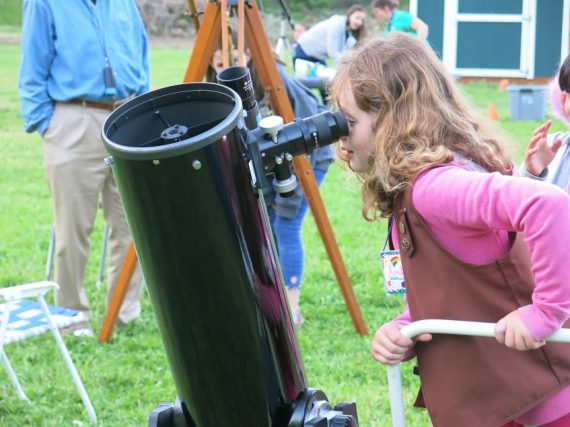
2) Girl Scout Space Science Badges
Here’s what the girls are learning in their badges and some engaging ideas to support their understanding (For more information: bit.ly/astroall):
- Daisy (Grades K-1) Exploring the movement of the Sun, Moon, and stars.
At this age, the focus is on play and discovery. They may have made up a constellation or
imagined a “woman in the moon.” This encourages observing skills at an age-appropriate level. If they arrive early, it can be fun to see who can spot the first star of the evening. Good observing targets for this age include the Sun, Moon, star clusters like the Pleiades, and simple constellations with a laser pointer. Tell stories, and encourage their new skills with phrases like,“I like how you talked about the detail on the moon” and, “What do you see differently through the telescope?” Lightweight, low-magnification binoculars work well for the youngest visitors! - Brownie (Grades 2-3) Investigate planets, telescopes, constellations, and Moon phases.
These girls are learning about our planetary neighbors and you may be able to show them some through your telescope. Rather than drilling them on facts, find out if they have a way to remember the order of the planets or which one is their favorite. If the Moon and Sun are up during your event, hold a ball up next to the Moon and show them how it is lit up in the same way. Model other phases and be ready to talk about an eclipse as the ball enters their shadow. Show them how your telescope works – where the light comes in and how the eyepiece magnifies the image. If they are interested, try out different eyepieces on the same target and let them notice the difference – the Moon, Saturn and Jupiter are great for this. - Junior (Grades 4-5) Exploring size and distance scales and movements in the Solar System.
By late elementary school, girls are ready to begin exploring the Solar System and beyond. Help them imagine how long it would take to travel to planets they can see through your scope. Think about how old you all are in Jupiter or Mercury years. Now that they have a handle on maps, you can introduce star wheels and help them find things in the night sky. Show them the gems hidden in their favorite constellations – the Orion nebula, colorful stars, clusters, etc.
All of these badges encourage girl-led explorations of space science, highlight female astronomer role models, and focus on cooperative, hands-on learning by doing. You won’t find a list of constellations they need to memorize. Rather, studies show that connecting young girls with positive science experiences is the first step in a life of engaging scientific explorations. We support the Girl Scout goals of increasing science interest, confidence, competence, and value for the girls. Realize that these girls may have heard the message that science is not for them. Be the voice that tells them they are welcome and encouraged to reach for the stars.
3) In-person and Online Workshops
The Astronomical Society of the Pacific is offering workshops aimed at doing great outreach with girls. Here are some of the upcoming dates. To find out more or to schedule a free workshop for your club or event, contact Theresa Summer.
Upcoming workshops – join us!
RTMC May 24-28th in Southern CA
Oregon Star Party August 7-12
TBD: North Carolina
Online workshops coming soon!
4) Resources and techniques for working with girls
Resources to come – stay tuned!
Read more about the project here.
5) Videos and articles connected to diversity and fairness
One of the ways to encourage girls is to approach your outreach with a “growth mindset.” Find out how in this article.
This video on young children and this one on pre-teens remind us that girls can do science and that the playing field isn’t always level.
We all affect the people we talk with. See what society tells these girls and what you can do to change your part in that.
For more information, check out the Girl Scouts page at JPL/Night Sky Network here.

© 2018 Astronomical Society of the Pacific www.astrosociety.org

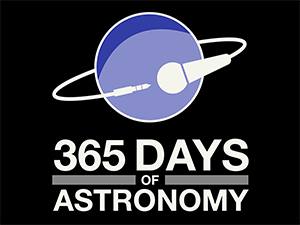
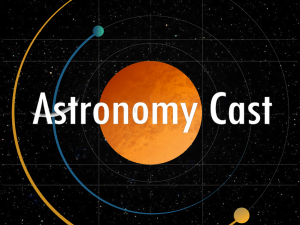

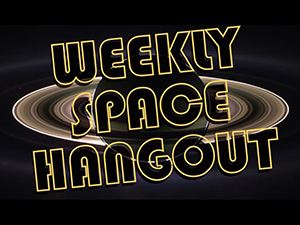 Join the Crew!
Join the Crew!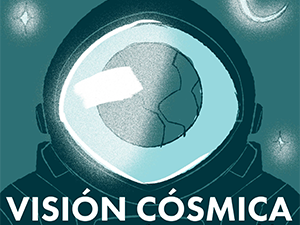
 Escape Velocity Space News
Escape Velocity Space News
0 Comments
Trackbacks/Pingbacks